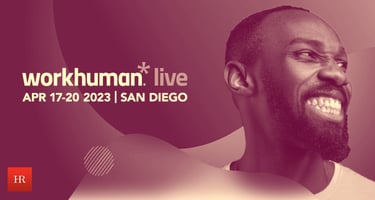Working for the objective might mean you miss the joy along the way. That’s it. That’s the message...
WorkHuman Live 2025 Recap: Show People What’s Possible
.jpeg?width=402&height=401&name=Image%20(13).jpeg)
This week, I had the privilege of attending Workhuman Live 2025, and I’m walking away with a head full of insights and a heart full of inspiration. The event was a powerful reminder that, in the age of AI, agility, and accelerating change, what truly sets organizations apart is still deeply human: connection, courage, and culture.
1. Human Data > Skills Hype
Jess VonBank from Mercer posed a provocative question: “Are we over-rotating on skills architecture?” It’s true—while organizations scramble to build skills-based systems, the reality is that skills are fluid, context-dependent, and notoriously hard to quantify. Fewer than 25% of HR leaders trust self-reported skills data, and AI-driven skills inference still misses the nuance of behavior.
Here’s the interesting twist: recognition data—those everyday moments when peers call out strengths—might just hold the key to understanding how skills actually show up in the real world. It’s not just about what people know; it’s about how they apply it, how others experience it, and how they grow over time.
2. Resilience Is a Muscle You Build—One Rejection at a Time
One of the most memorable sessions came from author and keynote speaker Alex Banayan, who broke down what he calls the “Rejection Inspection.” Rejection, he reminded us, is inevitable—but it doesn’t have to be defining.
His three-part framework offers a human-centered way to reframe failure:
- Reset the system (go for a walk, take a nap, grab ice cream)
- Realign the navigation (remind yourself why you do this work)
- Reexamine the engine (question the story you're telling yourself)
The stories we tell ourselves—about our worth, our future, and our potential—shape everything. And in a field like HR, where we’re often the emotional engine of the organization, learning to process rejection with grace and grit is mission-critical.
3. Curiosity Creates New Worlds
.jpeg?width=334&height=526&name=Image%20(7).jpeg) Trevor Noah brought wisdom and wit to the stage, offering a powerful reflection on the role of curiosity in uncertain times. “Prepare for what you would like to do—even if that job doesn’t exist yet,” he said. In a world where AI is reshaping industries, and job descriptions are constantly evolving, this mindset is gold.
Trevor Noah brought wisdom and wit to the stage, offering a powerful reflection on the role of curiosity in uncertain times. “Prepare for what you would like to do—even if that job doesn’t exist yet,” he said. In a world where AI is reshaping industries, and job descriptions are constantly evolving, this mindset is gold.
AI won’t solve everything, but it will create new possibilities. The key is to stay curious, keep asking better questions, and be ready to grow into spaces that don’t even exist yet.
One of the most recurring messages throughout the conference: show people what’s possible, not just what to do. Whether it's about building inclusive cultures, adopting new technologies, or bouncing back from setbacks, leaders who lead with transparency and vulnerability are the ones who drive real change.
Implicit messaging—what we do, not just what we say—has far more power than we often realize. If we want employees to be agile, open-minded, and resilient, we have to model that ourselves.
The future of work isn’t just about strategy or structure. It’s about storytelling, belonging, recognition, and resilience. So, as I head back to the day-to-day, I’m carrying with me a renewed sense of purpose—and a sticky note on my desk that says: “Show people what’s possible.”




Blog comments